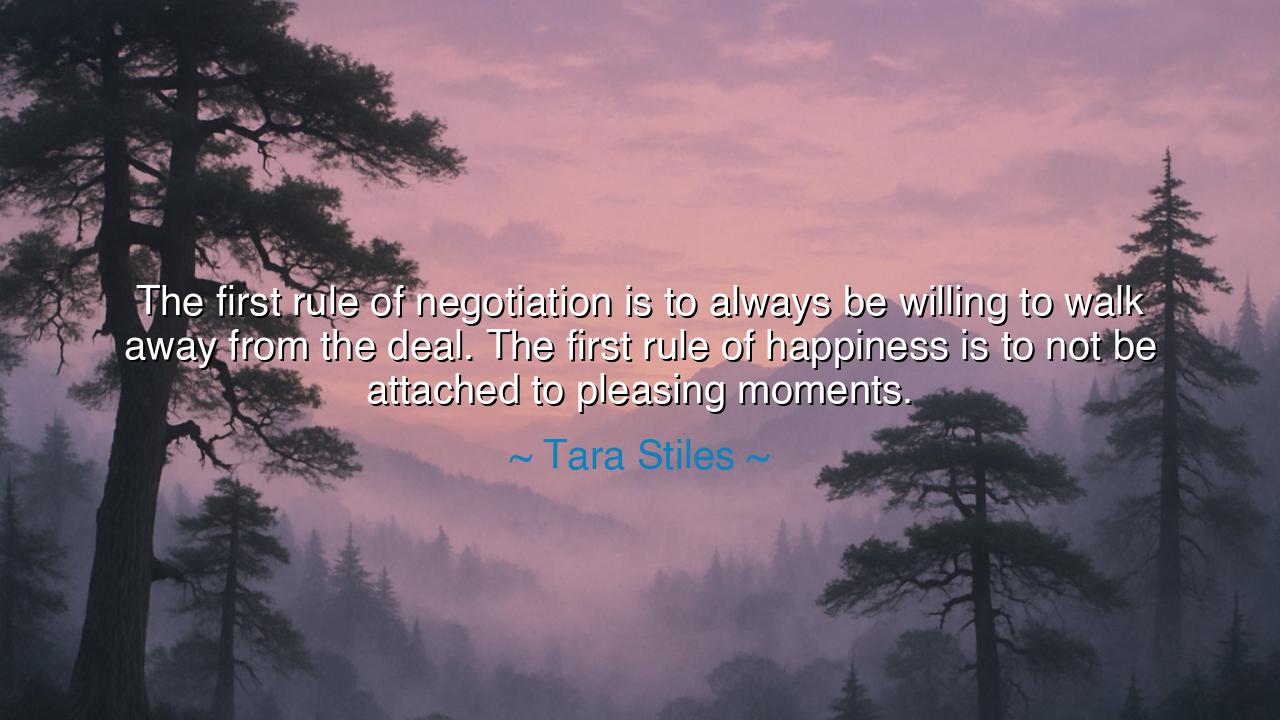
The first rule of negotiation is to always be willing to walk
The first rule of negotiation is to always be willing to walk away from the deal. The first rule of happiness is to not be attached to pleasing moments.






In her quiet yet piercing wisdom, Tara Stiles, the modern philosopher of mindfulness and movement, once spoke: “The first rule of negotiation is to always be willing to walk away from the deal. The first rule of happiness is to not be attached to pleasing moments.” These words, though simple in tone, resound with ancient truth — for they remind us that freedom, not possession, is the heart of both success and joy. Whether one is negotiating with others or with life itself, the secret lies not in clinging, but in letting go.
The origin of this insight lies in Stiles’s own path — a dancer turned yoga teacher, a seeker who chose to live in harmony with the flow of life rather than its demands. Her teaching bridges the practical and the spiritual, the worldly and the eternal. In the realm of negotiation, she reminds us that power belongs to the one who is not enslaved by outcome. To “be willing to walk away” is to stand in one’s own worth, to know that no external agreement can define inner peace. The same law governs the soul’s happiness: the one who depends on fleeting joys, who clings to “pleasing moments,” becomes bound by them, and thus loses the stillness of contentment.
To grasp her meaning more deeply, consider this: in every negotiation, there are two forces — desire and fear. Desire whispers, “Take what you can, for you may not find another chance.” Fear echoes, “If you lose this, you lose everything.” But true mastery begins when one realizes that neither voice speaks truth. The wise negotiator, like the sage of the heart, stands silent between the two — unshaken, grounded, willing to walk away if the path leads to compromise of spirit. For when one is not desperate, one becomes powerful; and when one is not attached, one becomes free.
This lesson extends far beyond the marketplace. Life itself is a constant negotiation — between comfort and growth, pleasure and wisdom, gain and loss. Many seek happiness in fleeting experiences: the beauty of a sunset, the warmth of love, the thrill of success. Yet these are but waves upon the ocean of time, destined to rise and fall. The one who clings to them suffers, for all that begins must end. But the one who enjoys them without attachment, who breathes them in and lets them go, lives in harmony with the eternal flow. As the Buddha once taught, “The root of suffering is attachment.” Stiles’s words echo this ancient principle, spoken anew for the modern soul.
Consider the life of Marcus Aurelius, the philosopher-emperor of Rome. Surrounded by power, wealth, and pleasure, he practiced daily the art of detachment. In his meditations he wrote, “Receive without pride, let go without attachment.” He ruled wisely because he was not enslaved by desire — neither for victory nor for luxury. When faced with loss or betrayal, he saw them as passing storms, not permanent defeats. His strength, like that of the enlightened negotiator, lay in his willingness to let go, to walk away from illusion toward truth. His example reminds us that detachment is not coldness, but clarity — the peace that comes from seeing all things as they are: temporary, yet beautiful.
Tara Stiles teaches this same truth through the language of breath and presence. To be unattached is not to withdraw from life, but to participate in it fully, without fear. To love deeply, yet without possession. To labor diligently, yet without anxiety. To rejoice in beauty, yet not to mourn when it fades. For happiness is not the absence of sorrow, but the freedom from dependency on joy. The one who walks lightly through the world, unattached to result or recognition, will always find peace — even amid chaos.
Let this then be the lesson for all who walk the earth: learn the art of detachment. When you negotiate, stand firm in your worth and know when to walk away. When you love, give without needing to own. When you experience joy, savor it without fearing its end. For the soul that clings, suffers; but the soul that releases, soars. Practice the strength of non-attachment daily — in your work, your relationships, and your quiet moments.
For as Tara Stiles reminds us, both in the marketplace and in the heart, the secret of mastery is the same. Freedom is found not in getting what we want, but in being unafraid to lose it. The one who can walk away from every deal — and from every fleeting pleasure — walks not toward emptiness, but toward peace. And in that peace lies the highest form of happiness — not the happiness of the moment, but the joy that endures beyond all moments.






AAdministratorAdministrator
Welcome, honored guests. Please leave a comment, we will respond soon